update:September 30, 2024
A special interview for the Toyota Foundation’s 50th year anniversary project
An American researcher’s journey from environmental activism to promoting food literacy and wild edible plant cuisine in Southeast Asia
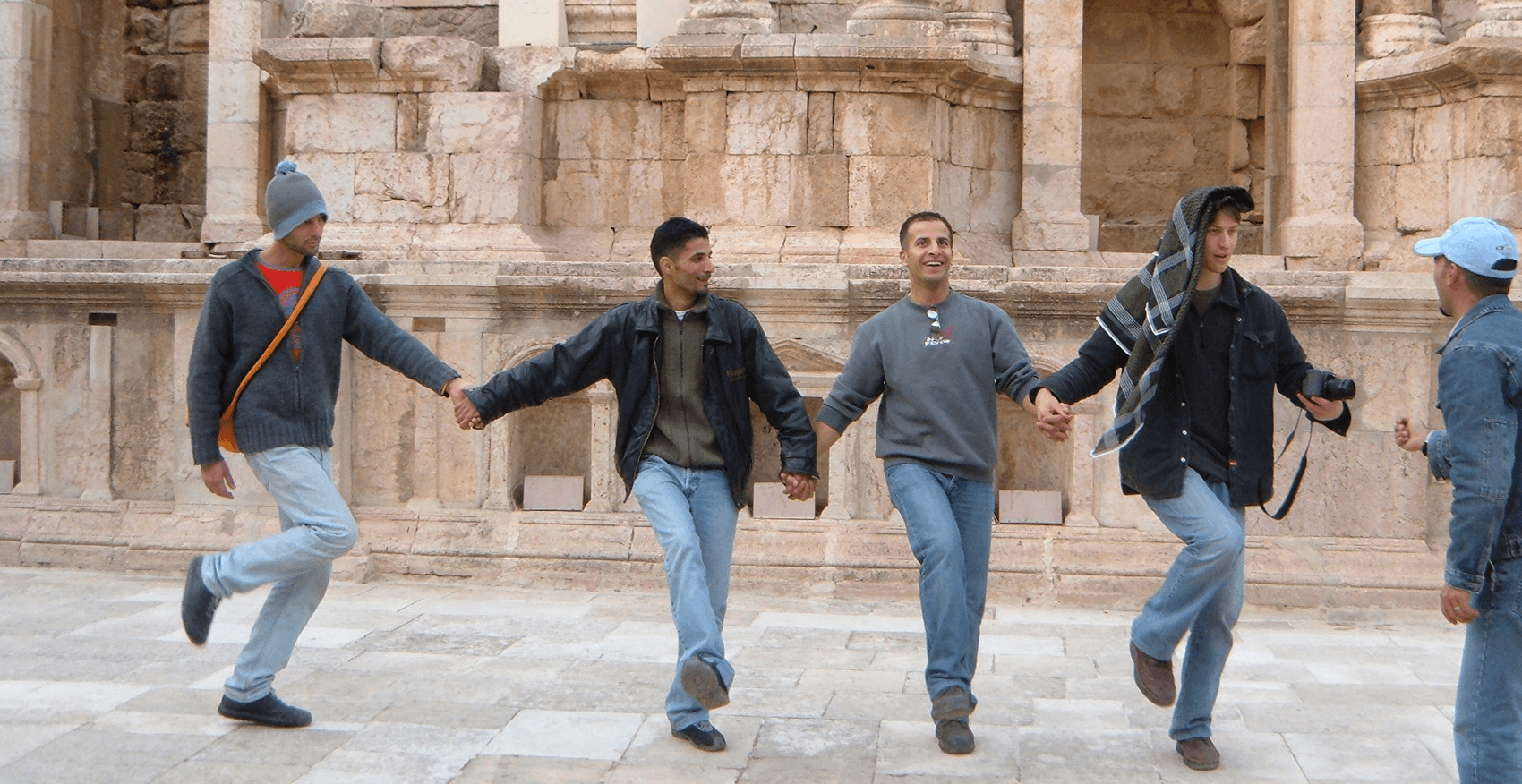
Interviewer: Hideo Tone
Writer: Naoto Okamura
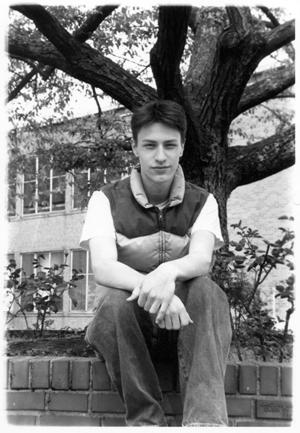
Associate Professor Hart Nadav Feuer of Kyoto University has made a life journey from his hometown of Portland, Oregon in the U.S. to the Middle East, Europe, Southeast Asia, and now to his current residence in Japan since 2015.
His academic interest in agriculture and environmental studies took him to the University of Oxford, where he received a Master’s degree, and later to the University of Bonn, Germany, where he earned his PhD. For his doctoral dissertation, he took a deep dive into Cambodia to do research on heritage food culture and traditional medicine of indigenous communities.
In Cambodia, Dr. Feuer found out about the difficulties ethnic minority people faced in preserving and passing on their traditional food culture, including the use of wild edible plants, to the younger generation due to the country’s industrialization and urbanization. He is now striving to help indigenous people keep their cultural traditions through food education and empower them to take pride in who they are and what they do as part of their customs.
In an interview conducted at his Kyoto University office in Japan’s ancient capital, Dr. Feuer talked about his life journey from his early activist days back in America to his current cross-cultural exchange research projects on Southeast Asian indigenous foods, as well as his dreams for the future.
Details
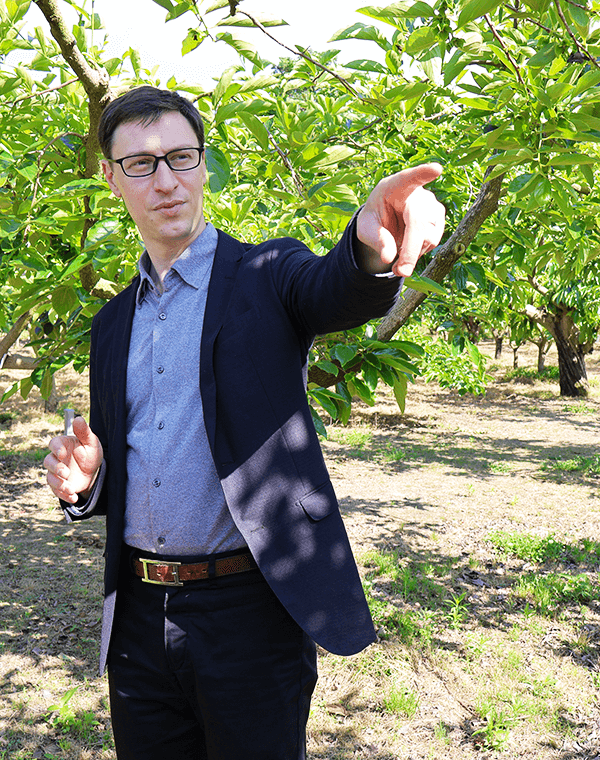
- Program
- 2016 International Grant Program
- Project Title
- Recognizing and Promoting the Value of Former Generations' Domestic and Community Contribution to Nutrition, Health and Family Balance in Disadvantaged Urban Areas
- Grant Number
- D16-N-0121

- Grant Period
- November 2016 to October 2017
- Main area of activity
- Malaysia, Cambodia, Japan
- Abstract of Project Proposal
- The respect for generational dietary knowledge is not uniformly shared throughout East Asia, as people tend to assume that elderly people cannot offer advice suited to the hyperactive urban areas of Asia. We set three goals. (1) Learning how food knowledge of previous generations is adapted to urban realities; (2) Discovering how previous generations help counteract negative dietary and lifestyle impacts in family and community; (3) Promote the unrecognized value of previous generations and increase their prominence in community and national policy, and multilateral programs.
- Program
- 2022 International Grant Program
- Project Title
- Advancing indigenous wild gardens for healthy and biodiverse food systems in Asia: A transboundary and transdisciplinary platform for science and ethnic minority collaboration
- Grant Number
- D22-N-0087

- Grant Period
- November 2022 to October 2024
- Main area of activity
- Malaysia, Taiwan, Cambodia
- Abstract of Project Proposal
- Historically valued by ethnic minority peoples, uncultivated foods such as Wild Edible Plants (WEP) have become popular in post-industrial societies nowadays. But stereotypes about wild foods as “uncivilized” remain, especially in poorer regions. Using trans-disciplinary boundary work between scientists, ethnic minority partners and local organizations in five Asian countries, this project aims to promote the social value and accessibility of wild foods for modern society by developing indigenous wild gardens that valorize the Local Environmental Knowledge (LEK), encourage mutual understanding between indigenous people, and bring wild foods into a new vision of modern living and eating.
His early days as a researcher, from the West to the East
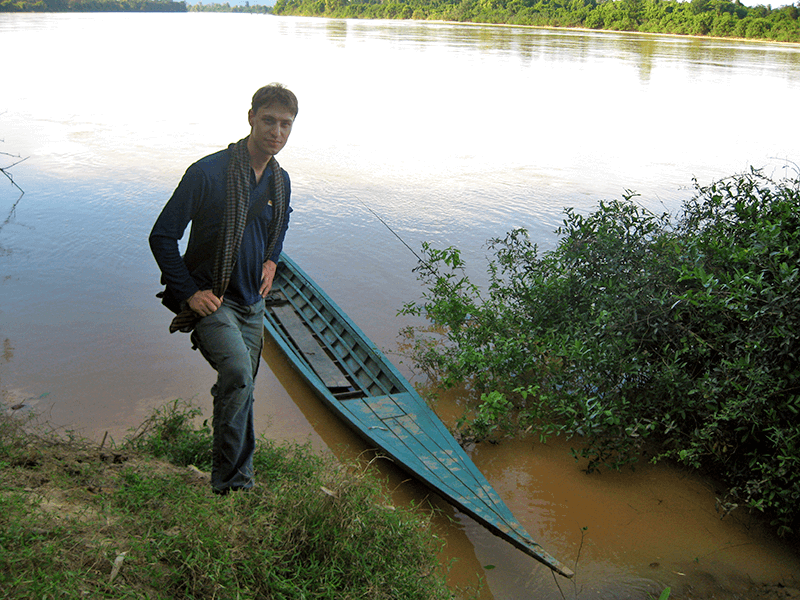
In his official capacity, Dr. Feuer calls himself an agriculture researcher. His professional career in agriculture-related fields goes all the way back to the days when he was an environmental activist organizing peaceful protests in the U.S. After college, he started working for an organization that helped local communities to build their capacity for fighting against big environmental threats through providing the legal and scientific knowledge –building human resources for the communities to help themselves. “In a way this was my beginning, an early training into this mode of empowerment, which I think has continued till now,” Dr. Feuer said. “This environmental activism pushed me to study ecological issues. So my first entry point was ecological agriculture.”
He then received a Fulbright Scholar Award to study at the Arava Institute for Environmental Studies in southern Israel for one year. The institute offers a program that combines agriculture, ecological studies, and peace studies together, where he had the opportunity to learn about Israel’s high-tech approach to agriculture and peacebuilding while living with students from Israel, Palestine, and western countries.
In fact, Israel is not a foreign land to Dr. Feuer. His parents moved to the country when he was a young child. Having lived there for three years, he grew up speaking Hebrew, along with his mother tongue English. While Israel and America are both countries of immigrants, he thinks there is a marked difference in food culture between the two nations; There is a hybridization of various cuisines from different countries in Israel, but that is not as pronounced as in the U.S. “If you ask people what is American cuisine, it’s not about the blending of cultures. It’s not a hybridization of Japanese, Thai, and Italian food…If you go to Israel, you see there is a lot of hybridization. They brought so many things from the outside and mix that together. I thought this was a very beautiful thing,” he said.
These experiences in his childhood and early adulthood in Israel have afforded him a source of inspiration and have eventually steered him towards his research on cross-cultural exchange projects involving ethnic minorities in Southeast Asia later in his life.
From 2006 through 2008, he studied ecological agriculture at the University of Oxford for his Master’s degree on a scholarship from the Jack Kent Cooke Foundation. During his two years at Oxford, he went to Cambodia to study some traditional agricultural products such as organic rice, palm sugar, and traditional medicine, and did research on how these things could be modernized and made more relevant for the next generation.
And yet, he witnessed firsthand how Cambodian people were relying less on traditional products and instead embracing industrial agriculture products in the name of greater efficiency. “I was concerned already about the next generation… I saw that people were using less palm sugar and more industrial white sugar. I wanted to understand how to make these [traditional products] more efficient and improve their ecological performance,” Dr. Feuer said.
This experience prompted him to work on these traditional agricultural products even into his PhD research. Over time, he started to focus more on the consumption side, i.e., consumers and cuisine, and how food cultures develop, in his research, for he came to realize that agriculture and consumption need to be connected. “If you don't have demand for any traditional food, it will disappear. This is kind of a fundamental problem… This was, for me, a trigger to understand that we need to think about the next generation and how they are getting interested in the food system or not,” Dr. Feuer said.
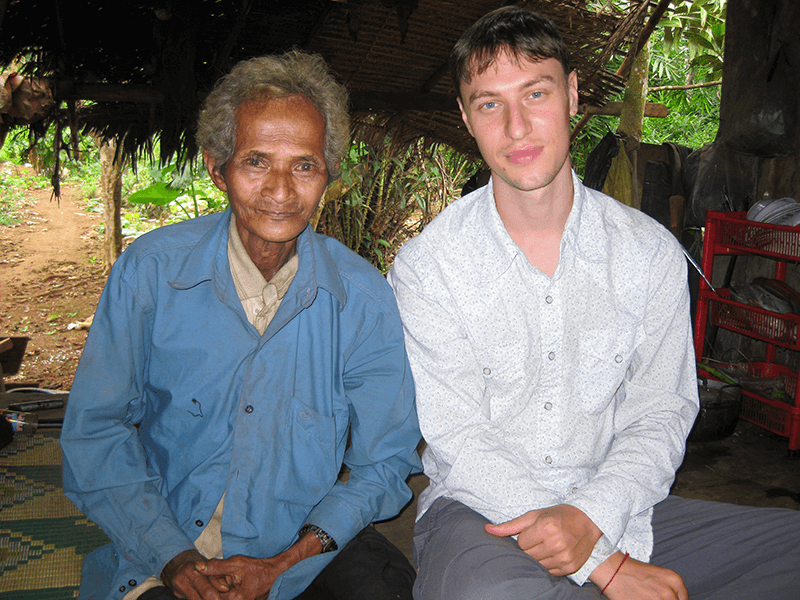
For his PhD, he found a supervisor in Germany who had been doing research in this field, so he decided to move to Germany to continue his studies at the University of Bonn. During his time there, he had the opportunity to meet other researchers from the Global South, including from Southeast Asia, who wanted to go back and make a difference in their home countries. These encounters have enabled him to build networks of colleagues and friends, including those researchers in the Philippines, Vietnam, and Taiwan, with whom he now works on his wild edible plant projects.
For his doctoral research, he spent a lot of time in Cambodia, trying to reach out to isolated ethnic communities in far-flung, hard-to-reach areas of the Southeast Asian country. But as with any adventures, this exploration came with a set of challenges. He contracted dengue fever and malaria and suffered a lot.
Undeterred and unfazed by such dangers and despite some initial hostility, Dr. Feuer was able to make a lot of friends in rural ethnic communities. It was only after he felt accepted by those communities that he realized how much unethical research activity had been conducted by other researchers before. “After spending some time living there, I found out that I wasn’t the first researcher to visit the community. The previous researcher came, documented the plants, photocopied the books, and left,” he said.
To his dismay, he learned that one of those researchers took a medicinal instruction book from an ethnic community’s traditional healer. This researcher fled and never came back. Dr. Feuer managed to track down this French ethnobotanist in Australia and asked him to return the book. “I found many other examples like this during my travels. People were very exploitative for their research purpose, and I really got shocked and disappointed by this,” he said. This realization has made him all the more cognizant of how important it is to conduct research by upholding ethical standards.
Research focus on wild edible plants (WEP)
At a 2015 conference in Oxford, Dr. Feuer met researchers from Malaysia, including Dr. Eric Olmedo who has become one of his closest colleagues and is engaged in gastronomy or the hospitality side of food culture. Since traditional food has a lot of rituals attached to it, those ritualistic aspects can be easily integrated into hospitality. Dr. Feuer has realized that hospitality is actually a way of communicating food culture to tourists and, in a broader sense, young people as well. That’s how he got more drawn into the field of food culture. “One thing that I saw as a very interesting connection between food culture and agriculture in the most basic sense was wild edible plants. Because they are, by their nature, traditional local foods,” he said, arguing that wild edible plants are the most anchored traditional foods in many regions.
In recent years, however, indigenous people have been struggling to find wild edible plants necessary for traditional food and medicine because of plantations and damage to natural resources. They fear that they risk losing a part of their culture. “So, we can promote those [wild edible plants] in a way that protects forests, protects indigenous people who have this knowledge [about wild edible plants], promotes the food culture, and promotes some kind of ecological agriculture. All of these goals at one time,” Dr. Feuer said.
As a researcher, he thinks his role is to help indigenous people through identifying plants and measuring what kind of medical properties and nutrient properties those plants have. “Which is only something scientists can do. We are really just a supporting structure for them,” he said. That helps ethnic minority people to build more confidence in talking about the effectiveness of certain plants.
Food literacy and a setback during Covid
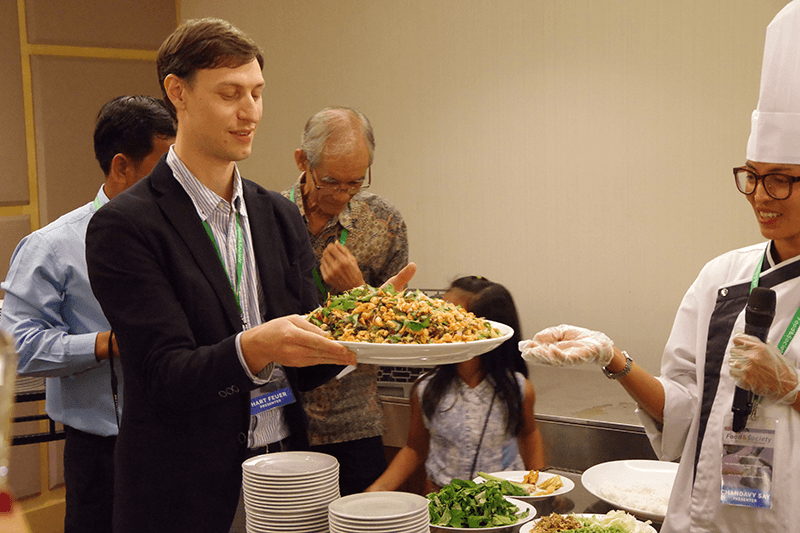
With the help of the Toyota Foundation, Dr. Feuer launched in 2016 his first grant-awarded project about youth, food culture, and intergenerational transmission of food knowledge.
It was also around the time when the concept of food literacy was becoming popular in many parts of the world. Food literacy is the knowledge, skills and behaviors that individuals, households, and communities can use to understand the complex global food system, and thereby more conscientiously find a role for traditional cuisine in the future. “I adopted this concept because I realized that children were growing up, and if they don’t develop food literacy, it will be very difficult for them to make decisions about food in the future,” Dr. Feuer said.
In 2018 and 2019, he launched pilot tests measuring the food literacy of about 300 school children in Cambodia. He began conducting similar tests in Japan targeting primary school children in Kyoto in an attempt to compare food literacy between children in the two countries. But unexpectedly, he experienced a major setback; the Covid-19 pandemic swept across the globe and it became all but impossible to go into schools, let alone conduct food-related activities.
Unable to travel outside Japan, he encouraged his partners in Cambodia to begin experimenting with ways to make wild edible plants more accessible. Some of his colleagues started a nursery for wild edible plants, began to gather them and tried to find a way to propagate them. Despite a lot of initial trouble, they had a lot of time during the pandemic to do experimenting. This is how a wild edible plant project came about at Cambodia’s National University of Battambang, and it eventually became very successful. “By now, that university project can supply wild edible plants to [wild] gardens all over Cambodia,” he said.
Meanwhile, Dr. Feuer has also advised Cambodia’s Ministry of Education, Youth and Sport to develop food literacy awareness within the upcoming school food program. Many nuclear-family parents in Cambodia acknowledge that they are struggling to transmit their knowledge about local foods to their children, putting more pressure on the school system to conduct food education. That’s exactly why he sees a pressing need for pushing food literacy and promoting a school food program in the country. “If you're going to start a school food program, you can not only use it to support local agriculture, but you can also use it for education,” he said. “If Cambodia can be a nice pioneer or pilot area where they include education on top of the school food program, that could rapidly spread to other Southeast Asian countries. If ethnic minority communities have schools, they should be able to have wild edible plants in their school food.”
This also comes amid a surge of interest in local cuisines among young Southeast Asian people. They now take more pride in local foods thanks in part to celebrity chefs who use traditional ingredients. “I hope and trust that young people will be the carriers of this kind of knowledge for the next generation. As long as we can keep up their basic food literacy, give them pride in their cuisines, as researchers we can support this process by making it possible to have the materials they need,” Dr. Feuer said.
Cultural exchanges among ethnic minority peoples
In addition to fostering food literacy in Cambodia, he has also embarked on cross-cultural exchanges between different indigenous groups from around Southeast Asia through another project supported by the Toyota Foundation grant starting in 2022. Based on his earlier experience of cultural hybridization in Israel, he believed that something would come out of such cultural encounters and engagement. “If you get ethnic minority people together, they will get along and be able to share. Actually, they can really share a lot together,” Dr. Feuer said.
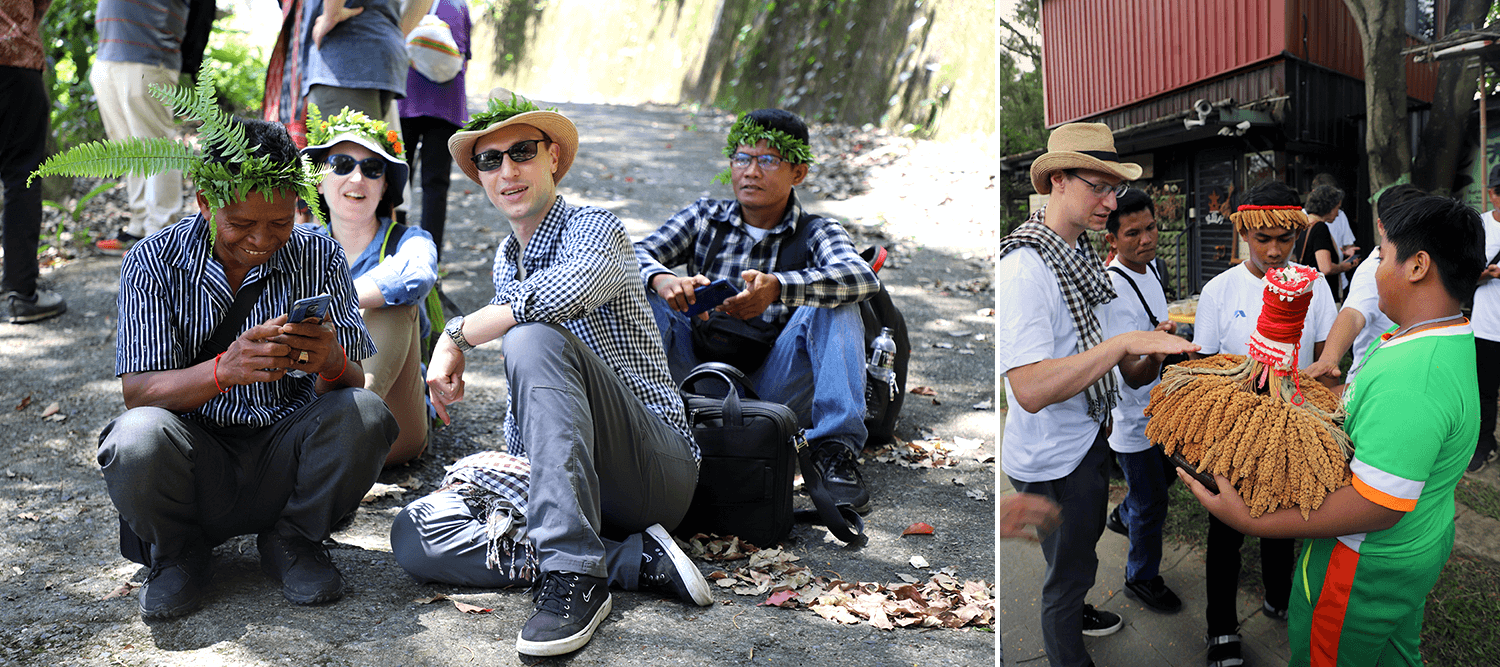
Speaking to a young Paiwan ethnic minority student in the Ping Tung area of southern Taiwan in 2023, along with young researchers and ethnic minority people from Cambodia, Malaysia, Vietnam, and the Philippines.
In March 2024, he and his colleagues, including Dr. Eric Olmedo, from other Asian countries gathered in Cambodia to study the progress of wild edible plant gardens that are designed to create healthy and biodiverse food systems and validate the local environmental knowledge (LEK) of indigenous people. Ethnic minority peoples from Cambodia, Malaysia, the Philippines, Taiwan, and Vietnam took part in this study tour-cum-cultural exchange event.
Many of these indigenous peoples, Dr. Feuer explains, often have ambivalent feelings about how they are perceived by mainstream citizens and are struggling to determine how to express pride in their identity. But communicating with other ethnic minority peoples from other Asian countries allowed them to feel comfortable to represent their own uniqueness. “They have no shame in the presence of other ethnic minority people. They are not embarrassed to reveal their identity. They realize it’s actually good to be honest about who you are,” he said.
What’s more, indigenous Cambodian people’s perception of their own traditional food has changed through interactions with outside experts like him and his colleagues. “Historically, ethnic minority people apologize about their food. It’s very sad because they are not proud of it at all,” Dr. Feuer said. “But increasingly, when a group of researchers asked ethnic minority people to cook for them, it has changed their perception completely. They have become very open to sharing and thinking more critically and creatively about how they can make this even better.”
For instance, Cambodia’s indigenous people and Filipino ethnic minority people both use the same wild plant, rattan. In Cambodia, they eat rattan, while their counterparts from the Philippines primarily use the plant to weave furniture items like baskets. Eating rattan was an eye-opening experience for the Filipino participants. They have been able to learn from each other through this cultural exchange. Dr. Feuer sees that as “a beautiful moment,” and noted, “There were many more chances for all these different ethnic minority people to communicate about how they see the [wild edible] plants.”
Significance of the Toyota Foundation grants
Dr. Feuer and his colleagues have so far conducted three food-related projects in Southeast Asia under grants from the Toyota Foundation. He sums up his experiences from those projects by saying, “The projects began with young people and end with how we contribute to the development of a cuisine that people will be proud of and want to pursue.”
However, it is true that ethnic minority people are very constrained in terms of resources. Without direct support, they cannot do so many things. That’s why Dr. Feuer thinks that a grant like the ones he received from the Toyota Foundation can be “a transformational moment” that can change the direction of something. “If you don’t have a grant, nothing dramatic will happen. To do something outside of their imagination, something courageous and ambitious, they need some kind of support,” he said.
“From an ethical point of view, it’s our responsibility as the researchers to help lower the risk for them. They should not be the ones taking any risk. They are already volunteering so much of their time and expertise. For us, the least we can do is to make it a smooth, low-risk process. We really want to be the support person,” said Dr. Feuer.
His dream and future outlook
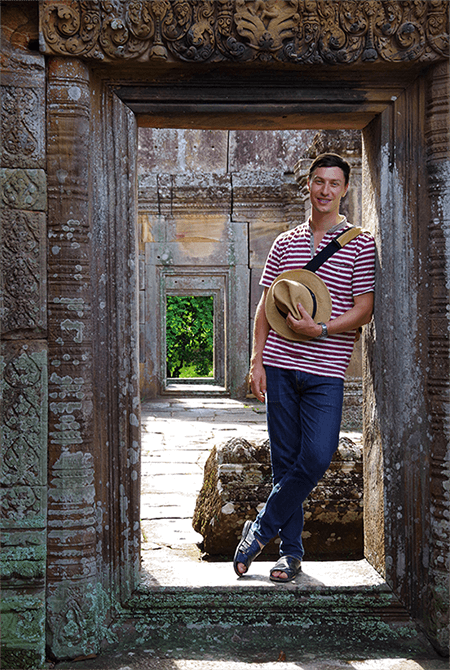
Looking ahead, Dr. Feuer is looking to find new partners who are self-motivated and want to make a difference in society. “The main goal of this type of expansion would be to bring in groups that have some kind of new perspective or some new ambition. The next step for me is not just about expansion. We are about innovation and experimentation. So, we really like people joining [us],” he said.
There is one group in Laos that he and his colleagues are considering collaborating with. In Southeast Asia, researchers usually need to send plant samples to Europe, Japan, or Hong Kong to do laboratory analysis. But this Laotian group has a program to train students to do laboratory analysis of wild edible plants in their country. “They will be so transformative,” Dr. Feuer said. “Laos might become the regional hub for laboratory analysis of wild edible plants. That will be an amazing thing because it’s a small country. For some reason, they are very passionate about it.”
As for his research in Cambodia, his dream is to get more young people interested in local food, including wild edible plants, and preserving that heritage food culture long into the future. And having an educational school food system in place in Cambodia will give children a chance to think about the food system and develop their support for local ecological agriculture, and traditional cuisine. “Add a school food program in Cambodia and in ethnic minority communities that have schools, then they should be able to have wild edible plants in the school food. And it should be something that also supports the local economy as well,” Dr. Feuer said. “If you want to condense it into one point, we should love traditional foods enough to protect and cherish them. But we should also love them enough to modernize them respectfully.”
